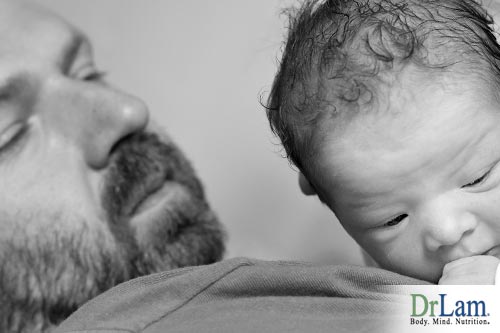 Postpartum blues has its roots in the process of pregnancy itself. When a woman is pregnant, her body must make drastic changes to accommodate the growing baby. Her body is not accustomed to the child, making it virtually a foreign object to her. This is not always easy on the body, especially as the unborn child grows bigger. Many different changes will affect a pregnant woman, including body aches, morning sickness, fatigue, constipation, and various other physical as well as emotional shifts. This is a normal part of pregnancy for many women.
Postpartum blues has its roots in the process of pregnancy itself. When a woman is pregnant, her body must make drastic changes to accommodate the growing baby. Her body is not accustomed to the child, making it virtually a foreign object to her. This is not always easy on the body, especially as the unborn child grows bigger. Many different changes will affect a pregnant woman, including body aches, morning sickness, fatigue, constipation, and various other physical as well as emotional shifts. This is a normal part of pregnancy for many women.
Over the course of a normal pregnancy, which is nine months, a woman's body must collect nutrients from her reserves so that she can feed and sustain the child. As the baby grows, it naturally needs more nourishment from its mother. In some cases, a woman's body will not have sufficient sustenance to give the child. In this situation, her body will be forced to take certain emergency measures to feed the baby.
Even if there are some issues with nutrients between the baby and mother, there is still a chance for a healthy pregnancy, especially if the woman is young. Young people typically have greater nutritional reserves and a stronger constitution. After delivery, however, the body must recuperate from its spent resources. A woman's body must try to conserve as much energy and nutrients as possible before and after delivering a baby, particularly if there was already hardly enough energy and nutrients during the pregnancy. Conservation of energy and nutrients during this crucial time of recovery and healing is often coupled with nursing, which requires substantial calories. Most new mothers are also sleep deprived as most newborns require feedings approximately every four hours. The drastic drop in hormones after childbirth, the conservation of energy and nutrients, nutritional requirements for breastfeeding, and lack of sleep are just some of the factors involved in postpartum blues.
The neuroaffective response relies on the autonomic nervous system, central nervous system, and gut. These three systems produce neurotransmitters that work in unison to affect your mood. Depression is seen when the neuroaffective response system is not balanced. This can happen at any time and lead to depression. During pregnancy, however, the body undergoes more stress than usual, and this can throw the neuroaffective system off balance. Inflammation of the gut is typically seen and can lead to inflammation of the brain as well. Suppression in serotonin, dopamine, and other neurotransmitters can affect the nervous system and can negatively impact mood.
It is somewhat common for women to voice their concerns about never recovering from their postpartum depression. After giving birth, many women find that they have a tough time recuperating. The primary issue is that a body needs sufficient time and resources to return to its previous state and heal through nurture and rest; and if it never receives this, it is bound to go on in fatigue and continue from one collapse to the next.
What does postpartum depression overall look like? Postpartum depression is a psychosocial and hormonal issue women often experience after childbirth. Within this particular problem, there are two types of postpartum depression—early onset and late onset. In the case of early onset, which is the most common, women will experience “baby blues” very soon after childbirth, but it usually subsides after a week or two.
In the case of late onset postpartum depression, however, depression hits women several weeks after delivery. This type is less common but more severe. In both cases, the individual will feel anxious, sad, irritable, guilty, afraid, otherwise emotional in a negative regard, and have trouble sleeping. In the event of the more severe type of depression it sometimes worsens over time. These negative emotions are often characterized by the fact that a woman does not experience them—or experiences them to such an extreme—until after childbirth when dealing with postpartum blues or depression.
 Although, as mentioned before, adrenal fatigue may play a major role in postpartum depression, there are many potential contributors. Insufficient sleep, low self-esteem, a stressful event, and a complicated or unwanted pregnancy may lead to postpartum depression, along with many other stress and psychological-related factors. Even some men may experience postpartum blues or depression after becoming a father. The physical triggers involved in postpartum depression are still somewhat debated, but most individuals agree that hormonal imbalances tend to be one of the leading triggers. Certain hormones increase during pregnancy, and others, such as cortisol and endorphins, drop after the child is born. These significant hormonal changes naturally involve the adrenal gland which is why adrenal fatigue often plays into postpartum depression.
Although, as mentioned before, adrenal fatigue may play a major role in postpartum depression, there are many potential contributors. Insufficient sleep, low self-esteem, a stressful event, and a complicated or unwanted pregnancy may lead to postpartum depression, along with many other stress and psychological-related factors. Even some men may experience postpartum blues or depression after becoming a father. The physical triggers involved in postpartum depression are still somewhat debated, but most individuals agree that hormonal imbalances tend to be one of the leading triggers. Certain hormones increase during pregnancy, and others, such as cortisol and endorphins, drop after the child is born. These significant hormonal changes naturally involve the adrenal gland which is why adrenal fatigue often plays into postpartum depression.
Preexisting constitutional weakness, specifically adrenal fatigue, can commonly lead to postpartum blues or postpartum crashes — also known as postpartum fatigue. There are other things which may end up causing postpartum issues in a difficult pregnancy, and adrenal fatigue can be one of these matters.
One easy way to understand this is to consider a rubber band. Although rubber bands are naturally versatile and elastic, if you stretch it out too long or too many times, it loses its elasticity and can't return to normal. This is the primary reason that women must be cautious after delivering a child and be cognizant of their health when trying to avoid postpartum fatigue. Pregnancy places stress on the adrenals and stretches out the rubber band. When the issues are caused at least in part by adrenal fatigue, it may be possible to identify it. Many times the effects of adrenal fatigue will be seen before the pregnancy--sometimes long before--and even long after delivery. Some symptoms of adrenal fatigue include subtle and often overlooked signs and symptoms such as PMS, first trimester miscarriages and a body that does not respond well to birth control pills before conception. Postpartum fatigue should be suspected if there are lactation problems, irritability, inability to sleep, fatigue, or hypoglycemia. All of these symptoms point to a body whose hormones are out of balance and in a weakened state. If a woman knows that adrenal fatigue is a contributing factor in her post artum depression and fatigue, it can help her and her caretakers to facilitate and understand her health and recovery.
It is thus crucial to start replenishing the body’s nutritional reserves even before conception and to continue during pregnancy. Doing this assists with many different issues, such as postpartum fatigue, and it can help in other ways, such as preventing miscarriages and ensuring smooth future fertilization.
Women experiencing acute post partum depression may feel embarrassed or ashamed to express their feelings, especially if they have particularly unloving thoughts about their infant, but the problem is not uncommon. It is important to seek help when it is necessary. No woman facing these challenges is alone and with professional assistance, the issue can be resolved much more easily. The sooner help is sought, the better it will be for the woman and her family.
 If a woman is experiencing a more mild form of postpartum depression, counseling will generally be sufficient to take care of the problem. In more severe cases counseling may be required in addition to antidepressant medicine. A counselor will help with emotional support as well as moving forward and goal setting. A mother may also want to take classes on parent coaching or infant massage, as this may help to strengthen and reinforce the maternal bond.
If a woman is experiencing a more mild form of postpartum depression, counseling will generally be sufficient to take care of the problem. In more severe cases counseling may be required in addition to antidepressant medicine. A counselor will help with emotional support as well as moving forward and goal setting. A mother may also want to take classes on parent coaching or infant massage, as this may help to strengthen and reinforce the maternal bond.
If depression and fatigue do not resolve within a short time of delivery, adrenal fatigue may be the underlying cause. In the setting of adrenal fatigue, it is important to prepare the body and support adrenal function before conception so that the additional stressors of the pregnancy can be appropriately handled. Once pregnant, it is important to continue aiding the body to replenish its nutritional and energy reserves, only then can postpartum depression and fatigue be effectively dealt with.
If you are experiencing any symptoms of postpartum blues or depression, consult with your Primary Care Provider about your concerns.
© Copyright 2016 Michael Lam, M.D. All Rights Reserved.
It may because you are feeding the baby throughout the night and day, leaving you with very little rest. Postpartum fatigue and crashes are quite common if the body is already weak, especially if the pregnancy is difficult.

